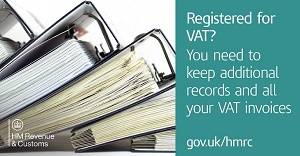ISSUING VAT INVOICES: The bills contain information required under the rules of Value Added Tax.
VAT invoices can only get issued by companies already registered for Value Added Tax. The business will need to:
- Issue paper or electronic sales invoices and keep records of valid invoices.
- Keep a copy of all sales invoices even if they get issued in error or they get cancelled.
- Keep copies of all purchase invoices on goods or services bought by the business.
In most cases, commercial invoices will already contain the correct information. They get used to calculate tariffs and international commercial terms. Thus, commercial invoices are often used for customs purposes.
Note: The business can only reclaim VAT on a valid invoice. Pro-forma invoices, delivery notes, statements, or invalid invoices would not count.
What Should a Valid VAT Invoice Show
As a rule, most transactions will use a full valid VAT invoice. In some cases, the business can issue a modified VAT invoice for retail supplies over £250.
For retail supplies under £250 the business can use a simplified VAT invoice. Likewise, the simplified invoice also applies to some other supplies since the 1st of January 2013.
HMRC VAT Invoice Requirements
| Information to be Included in a VAT Invoice | Full VAT Invoice | Simplified VAT Invoice | Modified VAT Invoice |
|---|---|---|---|
| A unique invoice number following on from the previous invoice | Required | Required | Required |
| The name and address of the business | Required | Required | Required |
| The business VAT number | Required | Required | Required |
| The date of sale | Required | Not Required | Required |
| Tax point or ‘time of supply’ if different from the invoice date | Required | Required | Required |
| Trading name and address of the customer | Required | Not Required | Required |
| A description of the goods or service | Required | Required | Required |
| The total amount excluding Value Added Tax | Required | Not Required | Required |
| The total amount of Value Added Tax | Required | Not Required | Required |
| The price of each item excluding Value Added Tax | Required | Not Required | Required |
| The quantity of each item excluding Value Added Tax | Required | Not Required | Required |
| The rate of any discount applied to the sale | Required | Not Required | Required |
| VAT rate per item (clarify ‘no VAT’ for exempt or zero-rated items) | Required | Required* | Required |
| The total amount including Value Added Tax | Not Required | Required* | Required |
Note: *Denotes that you show the information for each item if they get charged out different rates of VAT.
VAT Invoice for Accounting Scheme
If your company is using the Cash Accounting System you must stamp an invoice with the date and amount paid. If you use the VAT Margin Scheme there are different rules for invoicing and VAT record keeping.
Deadlines for VAT Invoices
As a rule, you must issue an invoice within 30 days of the date of supply ‘tax point‘ of goods or services. The invoice deadline would be the date of the payment if you paid in advance.
VAT Invoicing for International Trade
If the company is trading internationally the invoices may not be in sterling (GBP). If VAT invoices get issued in a foreign currency or a foreign language they must show:
 The tax amount payable in sterling on the invoice if the goods or services get supplied from the United Kingdom.
The tax amount payable in sterling on the invoice if the goods or services get supplied from the United Kingdom.- An English translation of all invoices if a visiting VAT officer requests them. The company would have 30 days to supply them for inspection.
If your business needs to convert to sterling it can use:
- The time of supply based on the market selling rate.
- The European Central Bank rate.
- The period rates of exchange from HM Revenue and Customs. In most cases, the rates will be the same for each calendar month.
- A different way to account for the Value Added Tax (apply to HMRC by phoning the VAT helpline number).
Note: Different rules apply for VAT invoicing if your business uses the Tour Operators Margin Scheme.
Exceptions for Writing VAT Invoices
There is no need for your business to write an invoice for Value Added Tax if:
- It gets written only for exempt or zero rated sales made in the United Kingdom.
- The goods get gifted away by the business.
- The second-hand margin scheme covers the sale of the goods (read more on VAT margin schemes).
- The purchaser operates self-billing arrangements.

